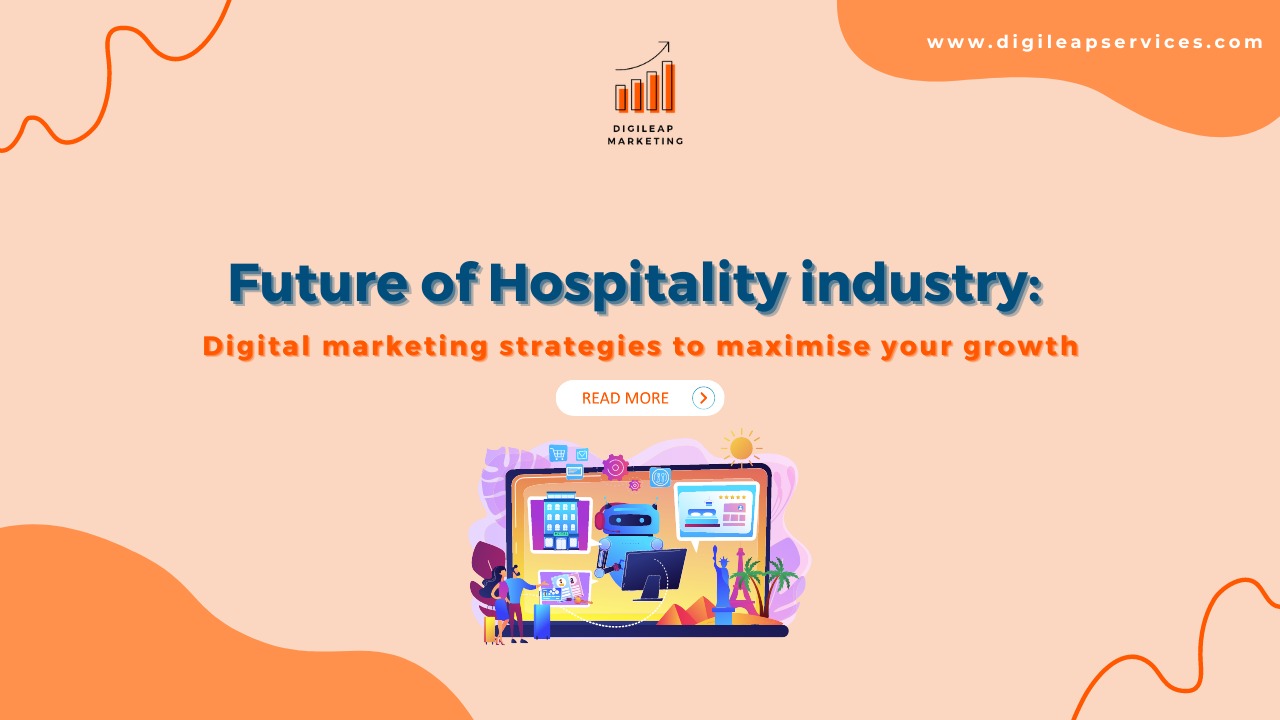Future of the Hospitality Industry Digital marketing strategies to maximize your growth
In the internet age, where information is freely available and clients can compare hotels, professionals in the hospitality industry must stay current on the latest digital developments. This can not only help you keep up with your hotel sector competitors, but it can also streamline operations and improve the customer experience you provide. This post will cover seven essential digital trends to pay attention to.
1. IoT (Internet of Things): It refers to ordinary gadgets with internet connectivity that can send and receive data. This technology is essential in the hospitality industry since it allows hotels to save money on electricity while also optimizing hotel rooms without human intervention. Some hotels use smart energy systems to lower light bulbs’ power during daylight hours, turn off the heating system when rooms are unoccupied, or attain a set temperature in occupied spaces. It is also used to optimize temperatures before guests arrive automatically.
2. Machines: Until recently, the usage of robots in the workplace was mainly limited to manufacturing lines. However, in the hospitality industry, AI-driven robots that mimic people are one of the developing digital trends, and these robots can execute a variety of complex, ‘intelligent’ duties. The Henn-na Hotel in Nagasaki is one of the fascinating examples to date. The ‘world’s first robot-staffed hotel’ has an information robot that provides tourist information, a front desk robot that can communicate intelligently, and a cloak robot that stores your items. A face recognition system that will check you in and prevent you from losing your key.
3. Recognition Technology: Recognition technology is another digital development in hospitality management. Recognition technology, which encompasses everything from facial recognition to fingerprint or retina scanning, is becoming increasingly widespread. Its applications in the hotel business are diverse, but most of them focus on expediting payment processes and lowering the amount of touch with human workers that is required. Apple’s Face ID and Touch ID, as well as Amazon Go stores and the ubiquitous usage of beacon technology have opened many people’s eyes to the possibilities of frictionless automation. In the future, hotels will likely use facial recognition for automatic payment authorization after leaving the restaurant or entirely automate the check-out procedure, avoiding waits.
4. Augmented Reality (AR): Augmented reality is a digital trend that is like virtual reality in many ways, but where VR completely changes the user’s surroundings, AR instead enhances real-world surroundings, usually with graphical or informational overlays. Hospitality industry employees can use this to provide various benefits to guests. Consider having a wall map at your hotel that, when connected with an AR app, allows clients to point their phones at an area of the map to get information about nearby attractions. Alternatively, several apps enable users to tell their phones at authentic eateries in their vicinity and quickly get customer evaluations.
5. Virtual Reality (VR): Virtual reality is one of the most exciting technological innovations in the hotel sector. Virtual reality has enormous promise in the hospitality business due to its capacity to successfully transfer customers to a digitally produced new environment. Many hotels already utilize 360-degree video and other virtual reality technology during the booking process and beyond. Some hotel chains are integrating virtual reality (VR) on their websites to allow consumers to experience their hotel rooms before booking them, allowing them to make more informed judgments about the size of rooms they require. Meanwhile, the technology can be utilized to deliver virtual tours of local sights or as entertainment within hotels.
6. Artificial Intelligence and Chatbots (AI): Chatbots respond to consumer concerns and requests with artificial intelligence, and this is one of the most beneficial digital advancements in the hotel business today. After all, it means that simple questions may be handled without involving a human agent, improving response times, and freeing human representatives to handle more complex matters. Artificial intelligence can also automatically analyze data, assist with revenue management strategies, and make personalized offers to clients depending on their interests. Meanwhile, Hilton has unveiled an artificially intelligent robot that can reply to human speech and answer questions.
7. Integration with Mobile Devices: Most people own smartphones and are accustomed to using them, from hailing an Uber to ordering lunch. Those in the hospitality business must prepare for this. A specialized hotel app that allows visitors to reserve restaurant tables, order room service, and book massage or spa treatments will help. While self-service can improve the client experience, applications can also be utilized to develop loyalty programs, resulting in more repeat business. Furthermore, the technology may be combined with the Internet of Things capabilities, allowing clients to control heating and lighting from the app.
8. Reputation Management: Finally, in an age where around 65% of clients check internet reviews before making a hotel reservation, reputation management has emerged as one of the essential digital trends of all time. There are numerous approaches that hoteliers can take to manage reviews, but they must be long-term. Respond to reviews on popular review networks and acknowledge genuine complaints from guests. Take appropriate action to address their problems to avoid such evaluations in the future. It is also critical to encourage satisfied customers to post evaluations, which they can do at the check-out desk or by email. Maintain your listings on internet review platforms, integrate reviews on your website, and aim to provide.
You can stay competitive in the hospitality sector and get an advantage over some of your competitors by recognizing and embracing the digital trends discussed in this article. All of the above trends can help improve the customer experience, boost your reputation for customer service, and maximize income creation.












